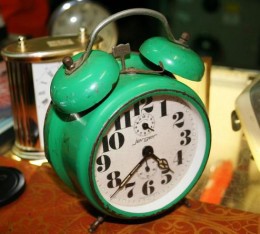We Are Our Best Alarm Clocks

Your sleep-wake cycle is regulated by a protein called PER. The protein level rises and falls each day, peaking in the evening and plummeting at night. When PER levels are low, your blood pressure drops, heart rate slows, and thinking becomes foggier. You get sleepy.
If you follow a diligent sleep routine — waking up the same time every day — your body learns to increase your PER levels in time for your alarm. About an hour before you’re supposed to wake up, PER levels rise (along with your body temperature and blood pressure). To prepare for the stress of waking, your body releases a cocktail of stress hormones, like cortisol. Gradually, your sleep becomes lighter and lighter.
And that’s why you wake up before your alarm. Your body hates your alarm clock. It’s jarring. It’s stressful. And it ruins all that hard work. It defeats the purpose of gradually waking up.
Mental Floss answers the question of why some of us frequently wake up five minutes before our alarm clock goes off, and that answer is basically that our body’s internal clock is made of magic (and proteins and hormones). Having a sleep routine helps with this, which means going to bed at a different hour each day will still make it hard for you to wake up before your alarm so you can get out of bed and go to work, or whatever it is you want to wake up for in the morning (i.e. exercise, children). My problem is that when my internal clock wakes me up and I see I have five minutes before my alarm will go off, I think “Yes! I have five more minutes of sleep.” So I go back to sleep. And then my alarm goes off five minutes later and it’s not pleasant.
Photo: Rob and Stephanie Levy
Support The Billfold
The Billfold continues to exist thanks to support from our readers. Help us continue to do our work by making a monthly pledge on Patreon or a one-time-only contribution through PayPal.
Comments